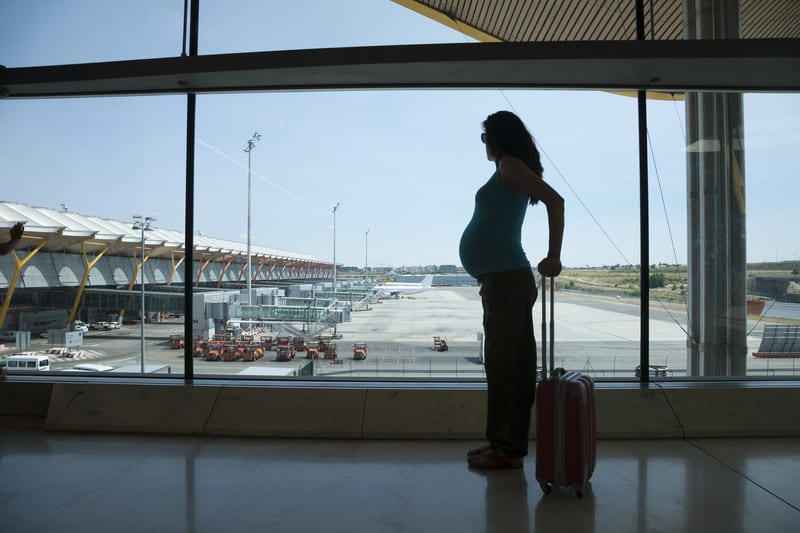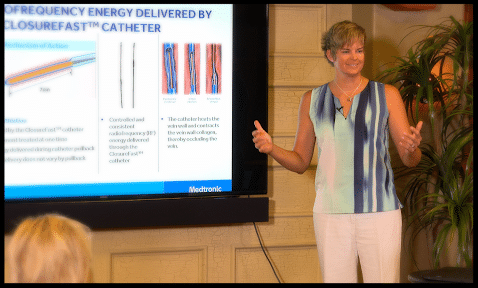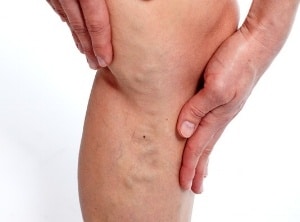
DVT and Varicose Veins during Pregnancy
DVT and Varicose Veins during Pregnancy
Pregnancy is a risk factor for the development of a blood clots with an incidence that is 4 to 50 times higher compared to non-pregnant women. Increased risk for development of a blood clot is highest in the postpartum period, with the most common occurrence of clot formation in left lower extremity and pelvis.
A blood clot, or venous thromboembolis (VTE) can manifest during pregnancy as a lower extremity deep vein blood clot, or it can break off from the lower extremities and travel to the lung, which is called a pulmonary embolus (PE). Pulmonary embolus is the seventh leading cause of maternal mortality or 9 percent of maternal deaths. Therefore, early detection of DVT during pregnancy is critical to preventing deaths caused by PE.
Pregnancy and the postpartum period are marked by the increased presence of components which contribute to the increased risk of DVT in pregnancy. Venous stasis of the lower extremities occurs during pregnancy because of two factors: increased blood volume, and hormonal changes to the lining of the veins. During pregnancy, lower extremity veins are subject to increased blood volume. Increased blood volume pared with hormonally induced dilation of the lower extremity veins leads to pooling of blood and causes incompetence in the valves. It is the pooling of blood in the veins that causes clots to form.
Read More
Why Do Varicose Veins Itch?
Is there anything worse than itchy varicose veins? Maybe, but itchy veins remains high on the list of issues we would love to resolve before they drive us crazy. If you are experiencing itching around your varicose veins, it could be a message from your body that it is time to have your veins checked…
Read MoreChronic Venous Insufficiency Video – Symptoms, Causes and Treatment
The full story on Chronic Venous Insufficiency, what it is and how to treat it. A video presentation by Jilanne Rose, DNP-C, Clinical Director. Run Time 24:46. TRANSCRIPT What’s the Difference Between Veins and Arteries? When we talk about vascular health and vascular disease most people think about arteries. When we talk about the…
Read MoreGilbert Residents Discuss Treatment of Venous Insufficiency
A group of Gilbert Arizona Residents concerned about Chronic Venous Insufficiency gathered on Saturday July 16th for an interactive discussion on CVI symptoms, causes and treatments. Chronic Venous Insufficiency, Venous Reflux Disease and Varicose Veins affect over 30 million American men and women. Unfortunately, many do not get treated as they believe varicose veins are…
Read MoreCan Venous Insufficiency be Reversed?
Can Chronic Venous Insufficiency (CVI) be reversed? Unfortunately the short answer to this question is no; but CVI can be treated with minimally invasive procedures which can reduce symptoms and improve quality of life tremendously! Chronic Vein Insufficiency Causes In order to understand why venous insufficiency or peripheral venous insufficiency cannot be reversed, we must…
Read MoreHow to Treat Bleeding Varicose Vein and Bleeding Spider Veins
What can you do to treat bleeding varicose vein and spider veins? First and foremost, don’t panic. Although the visual effect of a ruptured varicose vein or bleeding vein can be alarming, there are some simple things that can be done to get the bleeding to stop. If you can reach the area that is…
Read MoreWhy do varicose veins hurt?
Why are varicose veins painful? The discomfort associated with varicose veins is caused by a combination of factors. When veins are weak, the blood which is supposed to return to the heart in a timely fashion, settles and pools in the superficial vein system. This pooling of blood worsens when patients stand or sit in…
Read MoreWhat is endovenous ablation?
Endovenous Ablation Definition Taken literally, endovenous ablation is the removal of a vein from within. ‘Endo’ means internal or inside, ‘venous’ refers to a vein, and ablation is to ‘remove’. In the instance of veins, it is no longer necessary to physically remove a vein from the leg (vein stripping) to improve symptoms or the…
Read MoreThe Newest Procedure for Varicose Veins Treatment
The newest procedure for the treatment of varicose veins was approved by the FDA about two years ago. It is what has been termed a non-tumescent non-thermal therapy. What this means is that it does not require a lot of numbing medicine to complete, and it does not use a heating element to close or…
Read MoreWhat is the Best Varicose Vein Procedure?
What is the best treatment for varicose veins? No varicose vein is the same; no person’s symptoms are the same; and so the best procedure for varicose veins is not always the same. The treatments associated with vein disease are based on a patient’s symptoms, vein size, location, contributing conditions, and ultrasound findings. Different…
Read More

